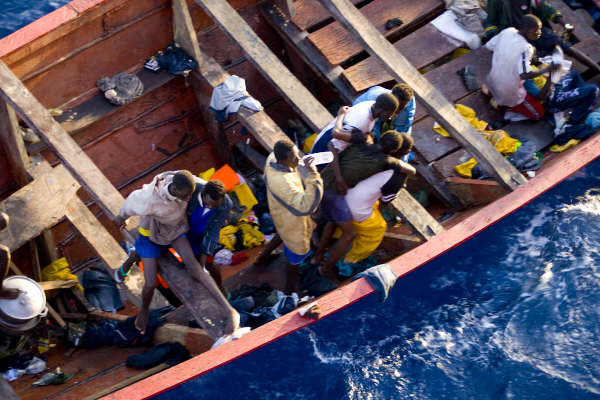Migrant Smuggling
Smuggling of Migrants is a crime involving the procurement for financial or other material benefit of illegal entry of a person into a State of which that person is not a national or resident. Migrant smuggling affects almost every country in the world. It undermines the integrity of countries and communities, and costs thousands of people their lives every year. UNODC, as the guardian the United Nations Convention against Transnational Organized Crime (UNTOC) and the Protocols thereto, assists States in their efforts to implement the Protocol against the Smuggling of Migrants by Land, Sea and Air (Migrants Protocol).

What is Migrant Smuggling?
The Migrant Smuggling Protocol supplementing the United Nations Convention against Transnational Organized Crime defines the smuggling of migrants as the
"procurement, in order to obtain, directly or indirectly, a financial or other material benefit, of the illegal entry of a person into a State Party of which the person is not a national or a permanent resident." (Article 3, Migrant Smuggling Protocol).
In order to comply with the Migrant Smuggling Protocol, Article 6 requires states to criminalize both smuggling of migrants and enabling of a person to remain in a country illegally, as well as aggravating circumstances that endanger lives or safety, or entail inhuman or degrading treatment of migrants.
Virtually every country in the world is affected by this crime, whether as an origin, transit or destination country for smuggled migrants by profit-seeking criminals. Smuggled migrants are vulnerable to life-threatening risks and exploitation; thousands of people have suffocated in containers, perished in deserts or dehydrated at sea. Generating huge profits for the criminals involved, migrant smuggling fuels corruption and empowers organized crime. Learn more about the crime of migrant smuggling here .
Migrant Smuggling - a deadly business
Currently, data is too scattered and incomplete to paint an accurate picture of numbers of people who are smuggled each year and the routes and methods used by those who smuggle them. Still, available evidence reveals the following trends and patterns:- Criminals are increasingly providing smuggling services to irregular migrants to evade national border controls, migration regulations and visa requirements. Most irregular migrants resort to the assistance of profit-seeking smugglers. As border controls have improved, migrants are deterred from attempting to illegally cross them themselves and are diverted into the hands of smugglers.
- Migrant smuggling is a highly profitable business in which criminals enjoy low risk of detection and punishment. As a result, the crime is becoming increasingly attractive to criminals. Migrant smugglers are becoming more and more organized, establishing professional networks that transcend borders and regions.
- The modus operandi of migrant smugglers is diverse. Highly sophisticated and expensive services rely on document fraud or 'visa-smuggling'. Contrasted with these are low cost methods which often pose high risks for migrants, and have lead to a dramatic increase in loss of life in recent years.
- Migrant smugglers constantly change routes and modus operandi in response to changed circumstances often at the expense of the safety of the smuggled migrants.
- Thousands of people have lost their lives as a result of the indifferent or even deliberate actions of migrant smugglers.
These factors highlight the need for responses to combat the crime of migrant smuggling to be coordinated across and between regions, and adaptable to new methods. In this regard, UNODC seeks to assist countries in implementing the Migrant Smuggling Protocol while promoting a comprehesensive response to the issue of migrant smuggling.

UNODC's Response to Migrant Smuggling
As the guardian of the United Nations Convention against Transnational Organized Crime and its supplementary protocols, UNODC's primary goal with respect to combating migrant smuggling, is to promote global adherence to the Migrant Smuggling Protocol and assist States in their efforts to effectively implement it. The Migrant Smuggling Protocol aims to:
- Prevent and combat the smuggling of migrants
- Protect the rights of smuggled migrants
- Promote cooperation between states
- Assisting states in bringing their legislation in line with the Protocol, and
- Assisting states in developing an effective criminal justice response to migrant smuggling
In 2006, UNODC released findings of a rapid assessment in a report, titled Organized Crime and Irregular Migration from Africa to Europe . The report explores the extent to which irregular migration from Africa to Europe is mediated by organized crime, and assesses the market for smuggling services, migratory routes, modus operandi of migrant smugglers and the role that organized crime plays in smuggling migrants from Africa to Europe.
In cooperation with partners, UNODC is actively involved in the I-Map . The I-Map is designed to facilitate information exchange and analyse migratory flows and routes, for the purpose of supporting counter-smuggling efforts undertaken at the international, regional and sub-regional level in Africa, the Near East and Europe.
UNODC is also supporting States in West and North Africa in implementing the Migrant Smuggling Protocol and strengthening their criminal justice systems, through its Impact Programme.
UNODC in cooperation with Interpol and Europol and with funding received from the European Union, is elaborating basic training modules on preventing and combating migrant smuggling. It has done this through a series of expert group meetings (EGMs) of law enforcers and prosecutors from around the world. The first EGM was held in 30th November to 2nd December 2008 in Saly, Senegal, the second EGM from 23rd to 25th March in Cairo, Egypt and the third EGM was held from 22nd to 24th June in Abuja, Nigeria.
Further information
To learn more about UNODC's Impact Programme against Migrant Smuggling in West and North Africa, click here.For more, visit our News and Events page
For a full listing of latest tools and publications, visit our Publications page
To learn about Human Trafficking, click here
For further information please contact the Anti Trafficking and Migrant Smuggling Unit .

No comments:
Post a Comment